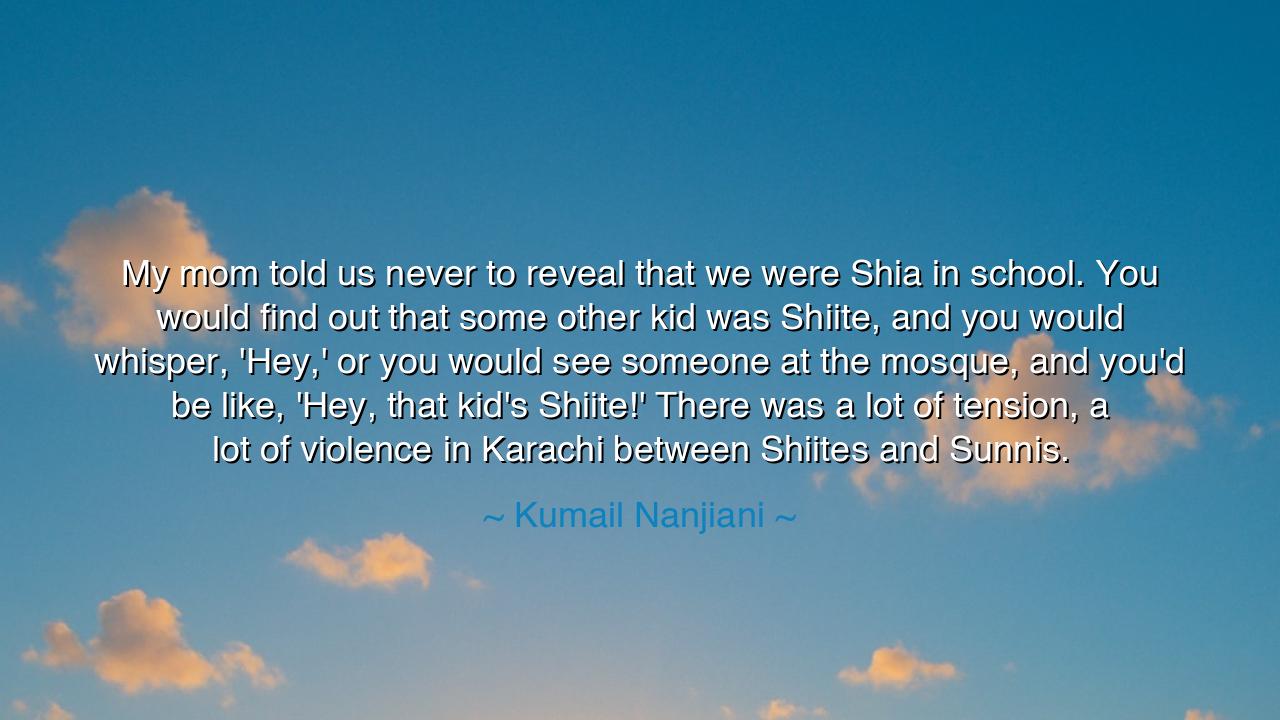
My mom told us never to reveal that we were Shia in school. You
My mom told us never to reveal that we were Shia in school. You would find out that some other kid was Shiite, and you would whisper, 'Hey,' or you would see someone at the mosque, and you'd be like, 'Hey, that kid's Shiite!' There was a lot of tension, a lot of violence in Karachi between Shiites and Sunnis.






When Kumail Nanjiani said, “My mom told us never to reveal that we were Shia in school. You would find out that some other kid was Shiite, and you would whisper, 'Hey,' or you would see someone at the mosque, and you'd be like, 'Hey, that kid's Shiite!' There was a lot of tension, a lot of violence in Karachi between Shiites and Sunnis,” he spoke not merely of childhood or faith — but of fear, identity, and survival. These words carry the quiet sorrow of those who must hide who they are in order to live in peace. They are the testimony of a boy raised under the shadow of sectarian strife, learning too early that truth, though sacred, can also be dangerous.
In ancient times, the elders said: “The truth that must be hidden is a burden upon the soul.” For the soul longs to be known, just as a seed longs for light. Yet there are times, as in Kumail’s youth, when the world’s cruelty forces the innocent to cloak their truth in silence. In Karachi, a city pulsing with life, love, and faith, the walls also whispered of division — Shia and Sunni, two branches of the same tree, torn apart by centuries of misunderstanding and pain. In such a world, a mother’s wisdom is not born of prejudice, but of protection. She teaches her children to live first, and to be proud later. It is the wisdom of survival passed down through generations who have seen the cost of being open.
To understand this, one must look back into the river of history. Humanity has always wrestled with its own reflection — brother against brother, tribe against tribe, all in the name of the same divine truth. Consider the story of Galileo Galilei, who once looked through his telescope and saw the heavens as they truly were — yet was forbidden to speak it aloud. The Church, in fear of losing its authority, silenced him. So he whispered his truth to the stars, saying, “And yet, it moves.” In the same way, young Kumail and his peers whispered their identity — “Hey, that kid’s Shiite” — as though speaking sacred words in exile. Each whisper was both a connection and a quiet act of rebellion against a world that demanded their silence.
But within such silence grows strength. For when one cannot shout one’s identity, one learns to carry it in the heart. The child who hides his truth does not lose it — he learns its value. To know who you are, when the world would rather you forget, is to possess a rare and unshakable kind of wisdom. Kumail Nanjiani, in his art and voice, later transforms that pain into understanding. He becomes not a symbol of division, but of bridge-building — a man who speaks across cultures and beliefs. His comedy, his films, his storytelling — all are forms of truth-telling born from the long discipline of silence.
There is heroism in such restraint. In a world eager to draw lines between “us” and “them,” those who live between the lines — who understand both sides — become peacemakers. The ancients revered such souls. They were called keepers of balance, those who could walk among many tribes and speak in many tongues. From his hidden beginnings in Karachi, Kumail grew into one of these rare voices, showing that identity need not be a weapon, but a bridge. His story reminds us that unity is not the absence of difference, but the acceptance of it.
Let us also remember the suffering that births such wisdom. When people must hide their faith, their love, or their heritage, a part of humanity itself is dimmed. Yet from that darkness, new light can emerge — compassion. To have known fear is to understand the sacredness of safety. To have hidden, is to yearn for a world where no one must. Thus, we who listen must learn not only from his words, but from the silence that came before them. We must vow to be builders of a gentler world — one where the names we bear, whether of sect, race, or creed, are spoken not in whispers but in peace.
The lesson, then, is both tender and powerful: truth is sacred, but so is survival. Never judge the one who hides, for sometimes the hidden seed becomes the tallest tree. From Kumail’s story, we are taught to hold compassion for those whose voices tremble under fear, and to use our freedom to speak for those who cannot. Let us raise our children to see differences not as dangers but as colors of the same light. Let us become the generation that ends the whisper.
So, dear listener, remember this: the divine does not live in division. It lives in every heart that beats, whether Shia or Sunni, east or west, believer or doubter. Kumail Nanjiani’s words are not just a memory of fear — they are a call to courage. Let them remind you that even in silence, the truth endures; even in hiding, the soul still shines; and even in a world of violence, love is the final word.






AAdministratorAdministrator
Welcome, honored guests. Please leave a comment, we will respond soon